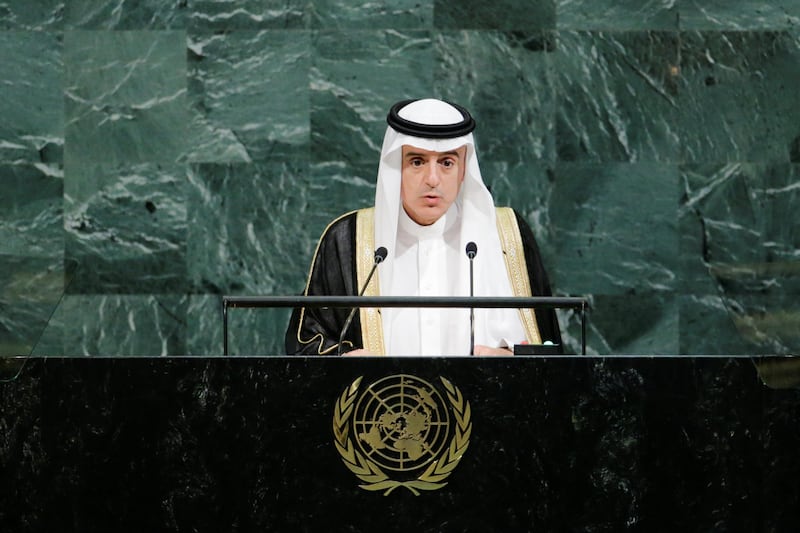Saudi foreign minister Adel Al Jubeir on Saturday condemned Qatar for supporting and financing terrorism in his speech to the United Nations General Assembly, calling on Doha to abide by commitments laid out in the so-called Riyadh agreements of 2013 and 2014.
In the agreements made with other GCC countries, Qatar committed to halting actions that would undermine the stability of the Arabian Gulf, including its support of the Muslim Brotherhood and extremist groups. Doha also agreed to not interfere in the internal affairs of other GCC members.
Referring to terrorism as “the biggest challenge facing the world" in his speech on Saturday, Mr Al Jubeir said Qatar was jeapordising Saudi Arabia's policy of combating extremism and terror financing.
“Doha’s practices of financial support to terror while disseminating hate speech is unacceptable, and so is providing safe havens to those who violated the law and should be brought to justice,” he said, adding that Riyadh “will continue to counter terrorism in all forms and manifestations”.
Saudi Arabia is one of four Arab countries boycotting Qatar over what they say is its support of terrorism — a charge Doha denies. The UAE is among the quartet, which cut ties with Qatar on June 5.
_______________
More from the UN General Assembly:
'World stands at a crossroads between modernity and extremism' says UAE Foreign Minister
[ Syria's foreign minister dismisses opposition as 'not credible' ]
[ Economic leverage being positioned as new mechanism to get Syrians to negotiating table ]
_______________
Mr Al Jubeir called on Qatar to abide by the 2013 and 2014 Riyadh agreements and reminded Doha of the commitment it made at an anti-terror summit in the Saudi capital in May to “put an end to financing terrorism”.
The 15-minute speech coincided with Saudi Arabia's National Day, something Mr Al Jubeir referenced in his opening remarks.
“At a time when my country is celebrating its national holiday, I address you as a messenger of a state that has placed its people as its first priority” and “created partnerships around the world”, he said.
The foreign minister defined peace and security as key pillars driving both Saudi domestic policy and foreign policy.
Turning to regional crises, Mr Al Jubeir first addressed the Palestinian-Israeli conflict, describing it as “the most protracted conflict in our region" of which "nothing can justify continuation”.
He urged the international community to come together around a two-state solution and make “concrete progress” in “establishing independent of Palestine with Jerusalem as its capital on the 1967 border”.
On Yemen, Mr Al Jubeir lambasted the actions of the Houthis, saying the Saudi-led military intervention launched in March 2015 “was not a choice” after a “coup d’etat” by the Shiite rebels.
“We are helping the legal government of Yemen, this was not a choice for us,” he said, referring to the Saudi-led coalition's efforts to restore the Yemeni government of president Abdrabu Mansur Hadi to power.
Still, he reaffirmed Saudi support for “the political process in Yemen” and stood by UN efforts to resolve the conflict.
Mr Al Jubeir accused Iran of being a state sponsor of terror and destabilising the region by supporting the Houthis in Yemen and fuelling the fighting in Syria.
Looking further afield, Mr Al Jubeir addressed the violence in Myanmar, which has seen more than 430,000 Rohingya Muslims forced to flee to Bangladesh in under a month.
“My country is concerned and condemns policies of displacement by Myanmar in Rohingya," the foreign minister said. "It requires our urgent response, and we call on Myanmar to respect its commitments and protect the population."
He added that Saudi Arabia was working with Bangladesh to ensure “decent conditions” for Rohingya refugees.







